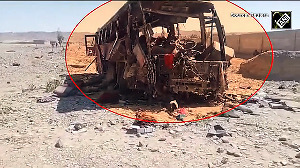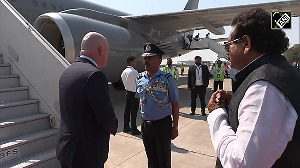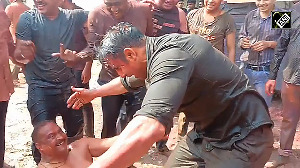This is what summed it up for many at the Gateway of India on Wednesday evening. The waves of people just kept coming, they poured in from every direction, taking over the roads that led to that mighty Gateway, which had become a symbol for rallying this great city today.
Police constables watched from behind the gates of the state police headquarters, a few metres away. Even the director general of police, A N Roy, was seen walking to his office because the giant mass of humanity had brought traffic to a slow crawl.
"Sahib is going to office," said the man following him with some files, slamming on a taxi door to make him stop so that the DGP could cross the road.
'We want our nation back'
There were slogans and banners and 'I love Mumbai' T-shirts and women with the tricolour painted on their cheeks. As far as the city's Churchgate station groups were shouting Vande Mataram, people distributed free water, youngsters walked with Che Guevara t-shirts and a bunch of women shouted 'We want change.'
What stood out in the gathering was the sizeable chunk of Mumbai's professionals, who had come straight from work with colleagues and friends. A sea of the Indian middle class -- the one that is criticised for just sitting in their living rooms and pontificating about the country's ills -- it was as if it was coming out of a reverie to get together and raise a voice for change.
"It's our Mumbai and such a gathering can only happen here. I am disgusted with what is going on in our country. I have never seen something like this before. Just stop giving bribes, this will change the city and the country. We have to make a fresh start," said ad filmmaker Prahlad Kakkar as he marched with the protestors.
'It's not about Mumbai, it's not about Delhi, this is about India'
Haresh Shah who runs the Yusuf Meherally Centre, named after the man who gave India the Quit India slogan stood at the median that divides the road leading to the Gateway. Shah, lives in Nepean Sea Road, is an architect and says it is time to beyond mere rhetoric.
"India should get international public opinion on its side. We should isolate Pakistan this way. What we are doing should make the people of Pakistan also rise up and ask for change from their rulers."
In between listening to sound bytes from minor celebrities who cross him, Shah warns us --
'I am not a Muslim, I am not a Hindu'
The lady did not want to be identified. "Where were you 15 years ago, why did you not protest after the Mumbai riots? I just want to know what is this damn tamasha now! This is all crap! Where were these people after the riots (in 1993) after people got killed in the streets and women were raped? Why did you keep quiet then? Why Enough is Enough now?"
Everybody stopped to hear her as she vehemently spoke about the terrorists operating within India. "Let us first clean up our own backyard and then scream about these terrorists. This is nothing but a television stunt."
As it happens, everywhere in India, people soon gathered around her, listening to her intently, even as people pushed and shoved around them. "She is right, isn't she? Where were we then?" asked a woman, preferring to be name-less, just one of the many who were there to speak their minds out, above the constraints of who they were, where they came from. Today they were only Mumbaikars and that was all that mattered.
'We cannot change it at once, but at least we have made a start'
The two female lawyers from the Bombay high court did not think this was any tamasha. Far from it! They were here because they wanted to be part of this. One of them came from a family of freedom fighters.
"We can come together as a nation for a cricket match, is this not a greater cause for change?" said her friend, "The time has come for us to work for change and we will."
The people's ire was directed at the politicians, for failing the country time and again. "Why are we protesting here? We should go outside the politicians' homes and do dharnas. They need to be taught what is the power of the people. So far what we have only seen is neta power."
For many who have never seen any mass protests -- Indira Gandhi's Emergency was too far away and the students agitation against the Mandal Commission Report of the early 1990s a distant memory -- this taking to the streets was their moment in history.
The heartbeat of a wounded city that will bleed, but will not bend






 © 2025
© 2025